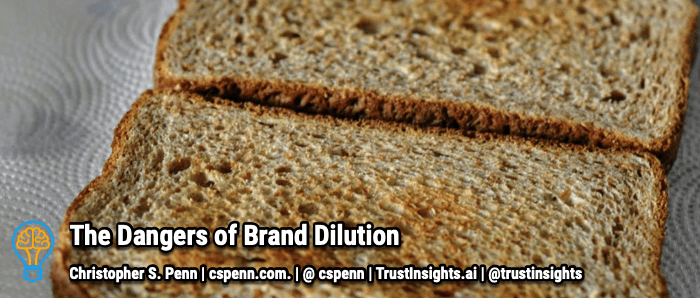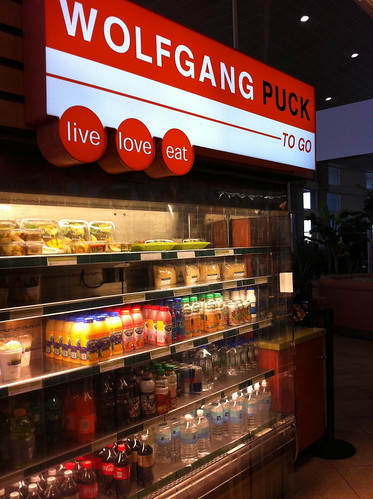
One of my favorite definitions of brand is by artist and comedian Ze Frank, who defines brand as:
An emotional aftertaste from a set of experiences.
Brand is identity, true, but it’s also how that identity feels, how it resonates with us. When we think about our favorite brands, we don’t consider those brands dispassionately. We don’t see brands as merely a collection of data points. Our reactions to brands are emotional – how the brands make us feel. Brand is emotion because emotion is what triggers recognition.
If brand is an emotional aftertaste, then brand dilution is when we spread that taste too thin, like too little butter on toast. We can spread a brand too thin by using it everywhere for everything, or by applying it to things that don’t live up to their promise.
For example, one of the worst cases of brand dilution I can think of is Wolfgang Puck. The famous TV chef licenses his name to just about everything food-related, even food that’s terrible quality. Here’s an example of his brand at an airport food kiosk which serves terrible food:

If you put the famous chef in front of the case bearing his name, what are the chances he’d say that the recipes were his own and were being displayed in the way he wants to be known? Probably zero.
What are the chances, if you were able to invite him to your kitchen, that he’d cook exactly what’s in the case if asked to produce that dish? Also probably zero.
What are the chances that, if you put his name-branded food on a plate in front of him, unlabeled, he’d think it were anything other than mediocre? Still probably zero.
Yet, he permits his brand – and a personal brand at that – to be used for things which are clearly out of alignment with what his brand stands for.
What happens when a brand dilutes itself? Our brand anchors, the memories that create the emotional aftertaste, change. They shift. They become anchored to the majority of the experiences we have with the brand, a new aftertaste. My anchor to Puck’s brand has shifted over the years. When I see Wolfgang Puck’s name on a product, the feeling it conjures up isn’t the sensual power of food his publicist is probably hoping for. It instead summons up crappy quality goods at very high prices, like the airport sandwich bar or crappy hotel room coffee, laughably billed as “Wolfgang Puck’s Chef’s Reserve”.
What does your brand stand for?
What emotions do you want associated with your brand?
Be very careful who you lend your brand to, who may use your name. If the product or service doesn’t fulfill your promise, your brand will suffer until the only emotional aftertaste left is bitterness.
Be doubly careful with your personal brand! It’s relatively easy to switch companies. Ruining your personal brand is just as easy and takes far longer and far more work to repair.
You might also enjoy:
- Almost Timely News: Recipes vs. Principles in Generative AI (2024-03-03)
- Fireside Chat: Geraldine Deruiter on Food, Feminism, and Fury
- Almost Timely News, January 14, 2024: The Future of Generative AI is Open
- Mind Readings: Generative AI and Addition vs Substitution of Jobs
- Almost Timely News, January 7, 2024: Should You Buy a Custom GPT?
Want to read more like this from Christopher Penn? Get updates here:
 Take my Generative AI for Marketers course! |


Leave a Reply